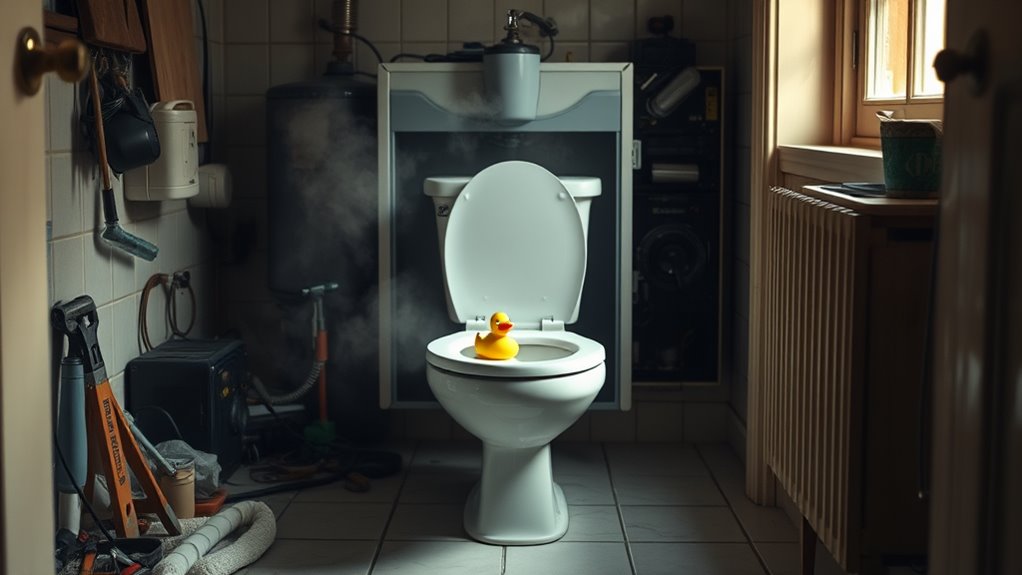You can use your toilet while the boiler's being replaced, but it depends on the project's specifics. Proper planning and clear communication with your contractor are essential. Alternative bathroom solutions, like renting portable toilets, might be necessary if disruptions occur. Inform your family about possible limitations on hot water access during the process. Ensuring you have temporary arrangements will help minimize inconvenience. Discover how to further prepare for your boiler replacement and enhance your overall experience.
Key insights
- You may experience temporary disruptions in hot water availability during boiler replacement, affecting toilet use.
- Communicate with your plumber about potential water flow interruptions to plan accordingly.
- Consider renting a portable toilet or using public restrooms if toilet access is compromised.
- Inform family members about possible bathroom access limitations during the replacement process.
- Ensure cleanliness and respect for shared spaces if neighbors offer temporary bathroom access.
Understanding Your Home's Plumbing System
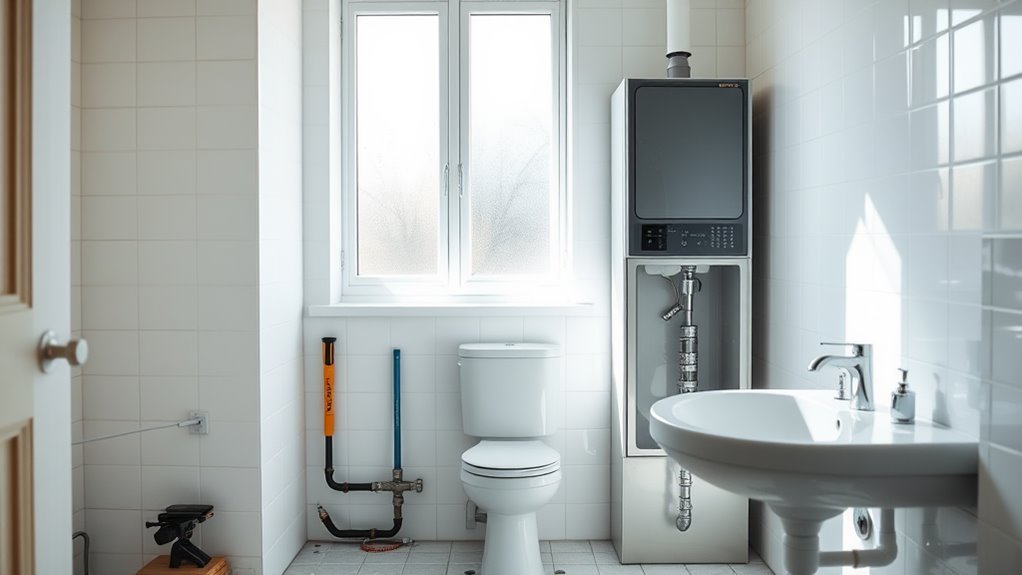
Understanding your home's plumbing system is vital, especially during a boiler replacement, since any disruption can affect your water supply and waste disposal. Familiarizing yourself with your pipe layout helps you identify where water and waste flows within your home. During maintenance, verify pipes are clear of obstructions and leaks are promptly addressed.
Knowing the layout allows you to anticipate potential issues that could arise during the boiler replacement process. If your plumbing relies on a specific configuration, alterations could lead to significant problems. Regular plumbing maintenance is important for maintaining efficiency and preventing emergencies. By keeping a close eye on your system, you can guarantee that your boiler replacement goes smoothly and that your toilet remains functional when you need it most. Additionally, ensuring energy efficiency during this process can help reduce operational costs in the long run.
The Role of the Boiler in Your Plumbing

The boiler plays a critical role in your plumbing system by providing both heat and hot water throughout your home. When it operates efficiently, it helps maintain consistent water pressure and guarantees you have hot water whenever needed. Understanding its function can help you manage your plumbing more effectively, especially during a replacement. Additionally, ensuring compliance with safety regulations is essential during any boiler work to prevent disruption to your plumbing system.
Boiler's Function in Plumbing
A boiler plays an essential role in your plumbing system by providing heated water and steam for various household needs. It supplies hot water for showers, dishwashing, and heating your home, ensuring comfort and convenience. Regular boiler maintenance is vital to keep it running efficiently, preventing costly repairs and extending its lifespan. In addition, during plumbing upgrades, integrating a high-efficiency boiler can greatly improve your system's performance, reducing energy costs and enhancing overall functionality. When you plan these upgrades, consider how the new boiler will interact with existing plumbing, ensuring compatibility. Understanding your boiler's function helps you appreciate its impact on daily operations and the importance of maintaining it to support your household's water heating needs effectively. Moreover, routine inspections can help identify potential issues before they become significant problems, ensuring your boiler operates safely and efficiently.
Impact on Water Pressure
While boiler replacement can seem straightforward, it greatly impacts your home's water pressure. The boiler plays a vital role in maintaining consistent water flow throughout your plumbing system. During replacement, you may experience pressure fluctuations due to changes in the system's configuration. These fluctuations can affect not just your hot water supply but also your cold water lines, leading to irregular flow rates when using fixtures like faucets and toilets. It's important to keep this in mind, especially if you rely on a steady water supply for daily activities. To minimize inconvenience, make sure your plumber provides clear communication about when water flow might be affected and how long you might experience these pressure fluctuations during the replacement process. Additionally, understanding the importance of regular maintenance can help ensure your boiler operates efficiently after installation.
Hot Water Availability
Understanding how your boiler affects hot water availability is essential for managing your home's plumbing system effectively. When your boiler is being replaced, hot water management can become complicated. During this process, you might experience temporary disruptions in hot water supply, impacting daily activities.
To navigate this situation, consider the following:
- Plan ahead: Schedule boiler replacement during low-demand periods.
- Temporary solutions: Use alternative heat sources like electric water heaters.
- Notify family members: Keep everyone informed about possible hot water shortages.
- Adjust plumbing: Confirm your plumbing adjustments accommodate the new boiler specifications.
- Consult professionals: Seek expert advice for ideal hot water management during the changeover. Additionally, understanding the energy efficiency of your new boiler system can help you make informed decisions about your overall heating and hot water strategy.
Types of Boiler Replacement Projects
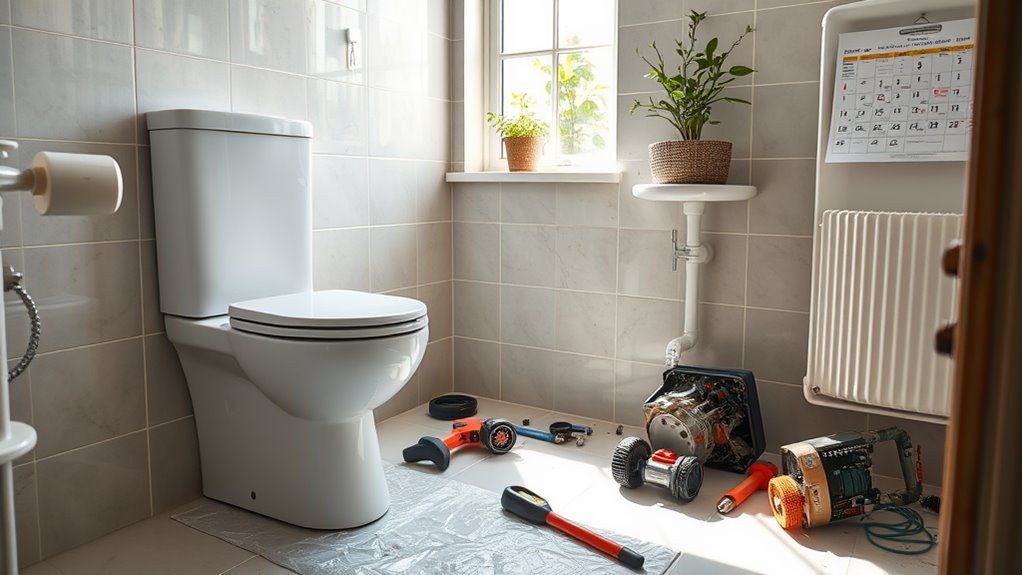
Boiler replacement projects vary considerably based on factors like the existing system, the building's requirements, and energy efficiency goals. You'll typically encounter three main types: combi boilers, system boilers, and conventional boilers. Combi boilers are compact, providing both heating and hot water on demand, making them ideal for smaller spaces. System boilers store hot water in a tank, suitable for larger households with higher demands. Conventional boilers, while traditional, may require more space and complex installations. If energy efficiency is a priority, consider high efficiency models that reduce fuel consumption and lower utility bills. Each type has its specific advantages, so evaluating your needs will guide you in selecting the right replacement for your home. Regular maintenance helps prevent error codes and enhances boiler longevity, ensuring optimal performance after installation.
Temporary Solutions for Bathroom Use
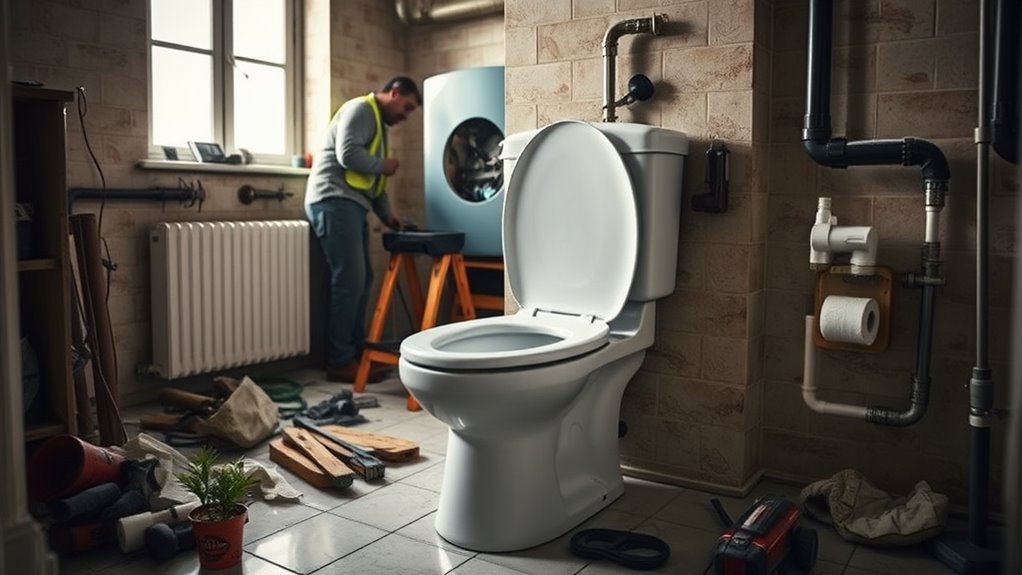
While your boiler is being replaced, you'll need effective bathroom solutions. Consider renting portable toilets, asking neighbors for bathroom access, or locating nearby public restrooms to guarantee you have options. Planning ahead will help minimize inconvenience during the replacement process. Additionally, ensure that your gas appliances are checked for safety, as outlined in the Commercial Gas Safety Certificate process, to avoid any potential hazards during maintenance.
Portable Toilets Availability
When your home undergoes boiler replacement, finding accessible bathroom facilities can be a challenge. Fortunately, there are portable toilet options to evaluate, allowing you to maintain comfort and hygiene during this period. Here are some restroom alternatives you might explore:
- Standard Portable Toilets: Commonly found at events, these are basic yet functional.
- Deluxe Portable Toilets: Equipped with amenities like hand sanitizer and even lighting.
- Trailer Restrooms: Offer a more upscale experience with multiple stalls and sinks.
- Composting Toilets: Eco-friendly options that don't require water.
- Mobile Restroom Rentals: Bring the bathroom experience to your site with various options. Additionally, ensuring the heating system remains efficient is crucial during this time, as regular maintenance can prevent breakdowns and reduce discomfort in the building.
Neighbors' Bathroom Options
Have you considered reaching out to your neighbors for temporary bathroom access during the boiler replacement? Utilizing shared facilities can be a practical solution while your home's plumbing is disrupted. Before contacting them, make certain you explain your situation clearly and politely. Most neighbors may appreciate the heads-up and may even be willing to accommodate you. Discuss alternative arrangements, such as specific times when it would be convenient for you to use their bathroom. Remember to maintain cleanliness and respect their space. This approach not only alleviates your immediate needs but also fosters good relationships within the community. Inquire about any shared facilities in your neighborhood that might be available to you as well. Additionally, having access to commercial heating services can ensure that you minimize downtime during maintenance or replacement tasks.
Public Restroom Locations
Finding public restroom locations can be an essential part of your planning during a boiler replacement, especially when your home's plumbing is temporarily unavailable. Knowing where to find accessible facilities can save you time and stress. Here are some tips for locating suitable options:
- Check local government websites for public restroom maps.
- Visit nearby parks or recreational areas, which often have facilities.
- Look for businesses like cafes or restaurants that allow restroom use for customers.
- Utilize smartphone apps that list public restrooms in your area.
- Inquire at community centers or libraries, as they typically provide accessible facilities. Additionally, be aware that extreme weather conditions can influence boiler performance and may affect your overall home comfort during this time.
Communicating With Your Contractor
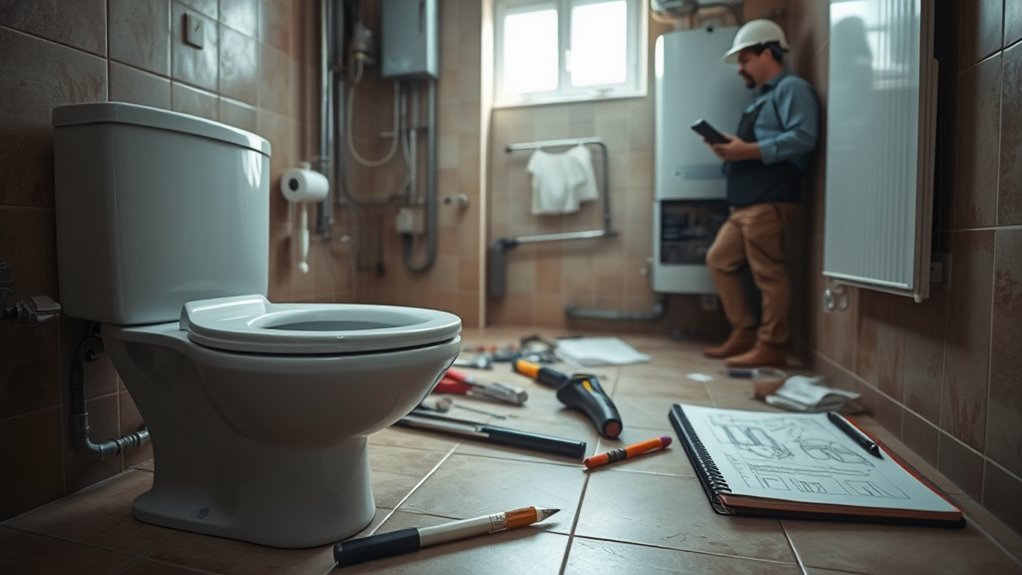
How can you guarantee effective communication with your contractor during a boiler replacement? First, establish clear project expectations from the outset. Discuss timelines, budget constraints, and any specific requirements you have. Make sure to ask questions to clarify any uncertainties. Regular check-ins can help maintain contractor communication, ensuring that both parties are aligned throughout the process. Utilize emails or texts to document conversations, which can serve as a reference if any discrepancies arise. Encourage your contractor to share updates on progress, challenges, or changes to the original plan. By fostering open dialogue, you can address issues promptly and keep the project on track. Remember, effective communication is key to a successful boiler replacement.
Preparing for the Replacement Day
With effective communication established, it's time to prepare for the replacement day. Proper preparation guarantees smooth replacement day logistics and minimizes disruptions. Here's what you need to take into account:
- Confirm the replacement schedule with your contractor.
- Plan bathroom access for the duration of the work.
- Move furniture or obstacles away from the boiler area.
- Make sure pets are secured and won't interfere with the work.
- Create a backup plan for toilet access if your primary option is unavailable.
Frequently Asked Questions
Will My Hot Water Supply Be Affected During the Boiler Replacement?
Yes, your hot water supply will be affected during the boiler replacement. Different boiler types can impact the duration of the outage. For instance, if you're switching from a conventional boiler to a combi, you might experience a longer wait for hot water as the new system is installed. It's best to plan ahead, so you're prepared for any interruptions in your hot water supply while the installation is underway.
How Long Will the Boiler Replacement Typically Take?
Boiler installation typically takes anywhere from a few hours to a full day, depending on the complexity of the system and your home's layout. You should expect the time frame to vary based on factors like the type of boiler being installed and any necessary modifications to existing plumbing or electrical systems. Communicating with your technician will give you a clearer estimate tailored to your specific situation, ensuring you're prepared for any disruptions.
Can I Flush the Toilet During the Boiler Installation?
During the boiler installation, you can generally flush the toilet, but there are plumbing considerations to keep in mind. If the installation affects water supply or drainage, it's best to check with your plumber first. They may need to temporarily shut off water or drain pipes, which could impact toilet usage. Always communicate with your contractor to guarantee that you're aware of any restrictions during the installation process.
What Should I Do in Case of a Plumbing Emergency?
In case of a plumbing emergency, first, shut off the main water supply to prevent further damage. Next, identify the issue, whether it's a leak, blockage, or broken fixture. Keep emergency contacts, like a trusted plumber, handy for quick access. Utilize plumbing tips, such as using towels to absorb spills and a bucket for dripping water. Acting promptly can minimize damage and save you from costly repairs down the line.
Are There Any Safety Concerns During the Boiler Replacement Process?
During boiler replacement, you need to prioritize safety precautions. Make sure you wear protective gear, like gloves and goggles, to shield yourself from potential hazards. When handling equipment, be mindful of sharp edges and heavy components. Keep the work area clear to prevent trips and falls. Additionally, make sure proper ventilation to avoid gas buildup. Following these guidelines will help minimize risks and make for a smoother replacement process, keeping you and your home safe.
Summary
In summary, while the boiler replacement process can disrupt your plumbing, you can often still use your toilet. Understanding your plumbing system and the specific type of boiler being replaced is essential. Communicate with your contractor to clarify any potential limitations on water usage. By preparing adequately and considering temporary solutions, you can minimize inconvenience and guarantee that your bathroom remains functional during the replacement project. Always prioritize safety and efficiency in these situations.

